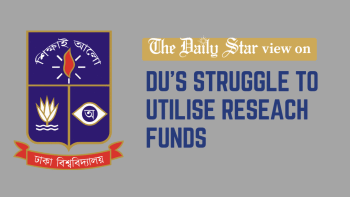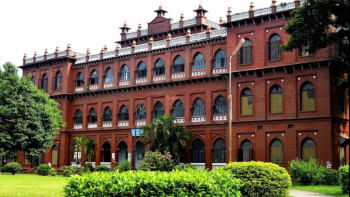Why are public universities so averse to research?

We are concerned by the persistent neglect of research at public universities, as evidenced once again by the just-announced budget of Jahangirnagar University. According to a report, out of a total Tk 323.35 crore budget for FY2025-26, JU allocated only 2.85 percent—just over Tk 9 crore—for research and innovation. Earlier this month, Dhaka University approved a Tk 1,035 crore budget with only Tk 21.57 crore—about 2.08 percent—allocated for research. The trend in other universities is more or less similar, and aligns with the similarly poor allocations for education in the national budget approved by the interim government, all of which shows how little priority knowledge creation or education in general holds in the country.
This is certainly not what one expected after a bloody uprising that sought a departure from the anti-people, anti-student practices of the past. To see the continuation of this trend of neglect feels like a betrayal to the promise of collective progress that can only be achieved through proper support for merit and innovation, especially at the universities where the leaders of tomorrow are forged. When it comes to research, the problem is not just underfunding. It's the entire public university ecosystem that seems designed to disincentivise research.
To see the continuation of this trend of neglect feels like a betrayal to the promise of collective progress that can only be achieved through proper support for merit and innovation, especially at the universities where the leaders of tomorrow are forged. When it comes to research, the problem is not just underfunding. It's the entire public university ecosystem that seems designed to disincentivise research.
For instance, one persistent problem has been the underutilisation of even the measly funds provided for research, which reflects the poor absorption capacity of the universities. The process of accessing funds is often mired in bureaucratic hurdles, discouraging faculty members from applying for grants. Thus, many opt for NGO or external funds instead. The lack of priority given to research or higher academic standards in case of faculty promotion also indicates a lack of institutional commitment. It is no surprise then that Bangladesh doesn't have a single university that qualifies as a real research institute. We remain trapped in a teaching-focused, degree-producing system that rarely nurtures scholars. Just imagine: over 92 percent of the JU budget has been allocated for salaries, allowances, pensions, goods and services!
This trend must change. Our universities cannot remain merely teaching institutions if we want to build a knowledge economy. The time has come to invest in research infrastructure and initiatives, not just in salaries or buildings. We urge the university administrations and higher education authorities to take this matter seriously, and ensure an enabling environment for research in our universities.


 For all latest news, follow The Daily Star's Google News channel.
For all latest news, follow The Daily Star's Google News channel. 









Comments